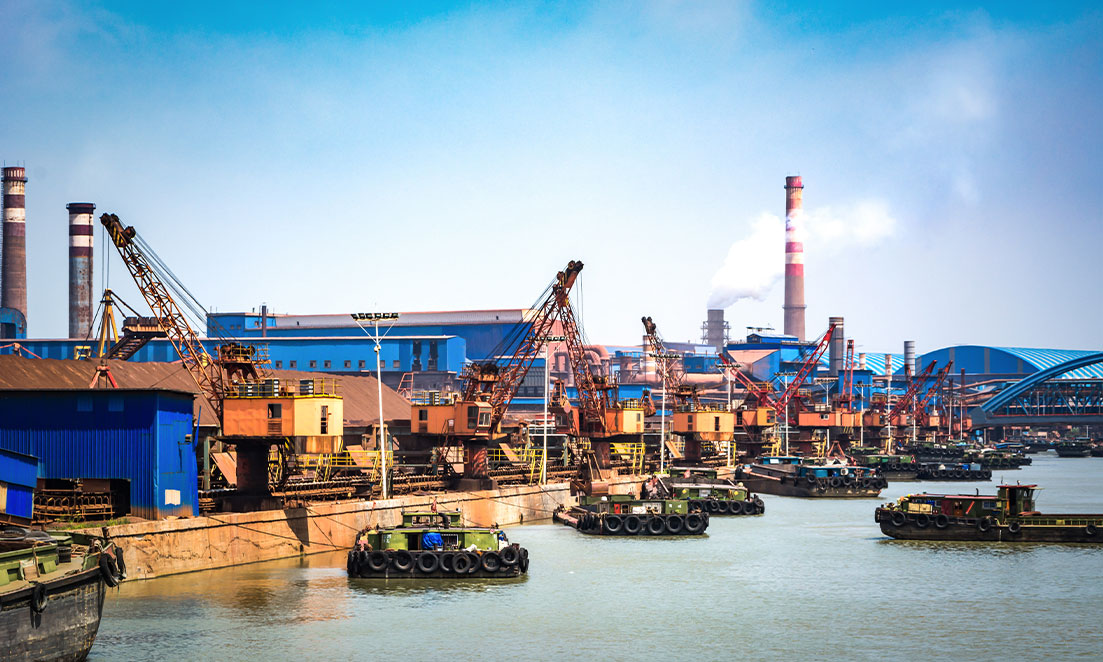LNG stands for Liquefied Natural Gas. It is a form of natural gas that has been compressed and cooled to liquid form. This is done for safety when the gas is kept in non-pressurized storage or when it is being transported.
LNG is a colourless liquid that forms when natural gas is chilled to -260 degrees Fahrenheit. During the cooling process, the gas shrinks up to 600 times in size. Since natural gas in its liquid state will not ignite, it is much safer to ship. When the LNG arrives at its destination, it is converted back into its gas form before being piped into homes and industries where it is used to generate heat and electricity.
How is LNG Transported?
LNG is transported using two main methods: by pipe and by vessel. When LNG is transported via pipelines, it flows from the liquefaction facilities until it arrives at re-gasification facilities. However, the process is not that direct. First, the LNG will have to get to the storage facilities. From there, it will then be loaded onto tankers. Finally, the tankers will take the LNG to the regasification facility.
Because LNG is significantly denser than CNG (Compressed Natural Gas), higher volumes of the gas can be transported each time.
During transport, LNG must be kept at a temperature of -260 degrees Fahrenheit to keep it at its liquid state. To maintain this temperature and to prevent re-gasification, LNG pipelines must be insulated. This normally pertains to a combination of insulation systems, for instance, foam glass and vacuum panels.
LNG is also transported through gas vessels. The majority of the world’s LNG exports take place inter-continentally, which means that LNG has to be shipped overseas. LNG vessels, also referred to as LNG tankers, transport massive amounts of liquefied gas. The gas is stored in double-hulled LNG storage tanks for safety.
What is the Pricing Trend for LNG?

The LNG market is limited to a handful of buyers and sellers, the majority of which belong to the Asia Pacific region. However, in recent years, there has been a global demand for natural gas. An increasing number of industries are realizing the negative environmental impacts of their current practices. In addition, the rapid development of LNG infrastructure, coupled with the awareness of LNG’s benefits, has made the gas highly favourable in other markets such as Japan, India, and China.
The LNG market is limited to a handful of buyers and sellers, the majority of which belong to the Asia Pacific region. However, in recent years, there has been a global demand for natural gas. An increasing number of industries are realizing the negative environmental impacts of their current practices. In addition, the rapid development of LNG infrastructure, coupled with the awareness of LNG’s benefits, has made the gas highly favourable in other markets such as Japan, India, and China.
What is the Demand for LNG in the UK?
The United Kingdom (U.K.) has four terminals that facilitate the importation of LNG — Isle of Grain, Teesside, South Hook, and Dragon. However, these LNG import terminals have rarely been used since 2012 due to their relative expense compared to local prices. As a result, LNG accounts for only a fifth of overall gas imports in the U.K.
Although the U.K.’s imports for LNG have seen a steady decline over the last few years, they are expected to make a comeback in 2021. This is partly due to a growing global oversupply of LNG as new players join the market, particularly those from the U.S., Asia, and Australia. The U.S. has exported its LNG to Asia for years, but with Europe’s competitive prices, the country could see an increase in imports from the U.S. any time soon.
Currently, the U.K.’s main supplier of LNG is Qatar, followed by Russia and the U.S. In 2019, the U.K. imported 97,670 GWh from Qatar, 34,442 GWh from Russia, and 32,649 GWh from the U.S.
With Qatar Petroleum’s plan to boost its liquefaction capacity by up to 43% in 2025, it may become the globe’s biggest supplier in five years. Currently, Qatar Petroleum is capable of producing 77 mtpa (million tonnes per annum) — they are planning to increase their capacity to 116 mtpa by 2026. Additionally, with U.K,’s movement toward renewable energy, the natural gas may eventually become the country’s fuel of choice.

What’s more, Shell believes that the global demand for LNG will double by 2040. New policies in favour of renewable sources are fueling the shift from coal to natural gas. This is aligned with the U.K.’s pledge to obtain net-zero emissions by 2050.
Who are the Main Players in the LNG Market?
The competition within the LNG industry is expected to grow due to the presence of major companies across several regions. The industry is also bound to see a surge in mergers as they attempt to gain a share of the market while diversifying their portfolios. Currently, some of the key players in the LNG market are:
- Qatar Petroleum
- Chevron Corporation
- Petronet LNG Limited
- Royal Dutch Shell
- Equinor ASA
- Petroliam Nasional Berhad (PETRONAS)
- China Petroleum & Chemical Corporation
What are the Advantages of Natural Gas?
- It is abundant. The International Energy Agency (IEA) believes that there is enough natural gas to supply consumers for 230 years.
- It is reliable. It can provide energy even when the sun isn’t shining or the wind isn’t blowing. It is much more reliable than solar and wind.
- It is clean. Natural gas is a hydrocarbon that produces half the carbon dioxide (CO2) that is produced by coal. Because it is environmentally-friendly, it enables industries to take part in the U.K.’s ‘net-zero’ target by 2050.
- It is more affordable than coal. According to the IEA, a gas-fired plant sees investment costs of around $1,100 / kilowatt, compared with $3,700 / kilowatt for a coal-fired plant.
- It is versatile. LNG can be used in transportation, as a cleaner alternative to diesel.

Because of its benefits, many businesses are switching their current business utilities for natural gas. Using natural gas not only helps the environment, but it also benefits businesses in terms of economic savings. Remember to first compare business gas prices before deciding on a supplier.
Ask the Experts
For further information on the benefits of using natural gas for your business, contact us today or dial 0161 833 8661 to get in touch with one of our representatives.
